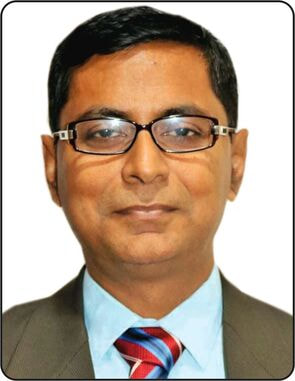|
Mr. Deepanjan Dey is a seasoned professional with 26 years of experience in Human Resource, Industrial Relations and HR Legal. He has worked in leadership role in various capacities such as Plant HR Head, Group IR Head and HR Legal Head across sectors – Print Media, Petrochemicals, FMCG, Refractory, Steel and Cement. Presently he is the Sr. General Manager- HR with Dalmia Cement(Bharat) Ltd and is based at Rajganjpur, Odisha. Few of the reputed companies he worked before are Haldia Petrochemical Ltd., Bata India Limited, Tata Metallics Ltd., Tata Steel BSL Ltd and Eveready Industries India Ltd. Before joining corporate/industries Mr. Dey was an Advocate and was mainly practicing in Labour Tribunal and High Court at Kolkata. Mr. Dey is a Postgraduate in Labour Laws and Personnel management and LLB from Sambalpur university, Odisha. Mr. Dey regularly contributes articles in professional journals. His area of interest mostly lies with employment laws and Industrial Relations. He also has a book on Contract Labour to his credit which was published in 2013. 1. How do you describe yourself? A petty ordinary person but fiercely honest and dedicated and devoted to my profession. I try to be very disciplined in all walks of my life be it my professional or personal. I fiercely believe unless and until you are disciplined, dedicated and devoted you will neither be able to bring happiness nor success in your life. 2. You moved from Legal to HR. Does your Legal experience help you achieve the desired success in your HR career? Yes, having a legal experience has helped me immensely. Application of mind is an important aspect of decision making. In view of legal footing and experience I have been trained early in my career to apply mind in right direction so that my decisions are legally correct and can stand the scrutiny of law. In India we have almost 64 or more labour laws. Even if four codes are made applicable but they will form the part of 29 subsumed Labour laws. Apart from these 29 labour laws and the other laws will remain as it is. Moreover, the principle that guide labour and service jurisprudence are different from ordinary civil laws. Hence, understanding of these laws is of paramount importance for any HR Manager not only for their day to day work but even for taking any strategic decision. Hence, my legal career has helped me to make right decisions as I transformed to a HR Manager. 3. What do you think are the biggest challenges ahead for the next generation of IR Leaders? The medium of communication has become very vast owing to the social media and other resources at disposal. Hence, present and future generation of IR managers will not be able to keep things under the warps. Mostly the things have to be transparent and decision making has to be fast. Besides, the workmen have now become aspirational. From mere survival and security, a workman now looks for a decent life for himself and his family. Hence, the future IR Manager will have the challenge to manage this expectation. 4. What are some strategies that can help young IR professionals achieve the success they want in their careers? IR is dynamic and therefore there cannot be any straight jacket formula or model for IR. What can be right at a relevant time may be wrong subsequently. The young IR professional should learn the art of investing on the emotional bank balance of the Trade Union leader with whom they have to deal on day-to-day basis. Besides, they need to learn as to how to educate the leaders and attune them to the objective of the company they work with. The leaders should feel the IR persons as their well-wisher and this will give the confidence to the leaders to repose faith in the IR person. 5. There is a strong criticism that “many HR professionals are Google made”. Do you agree with this? To an extent yes. I have found many HR professionals obsessed with formats, fundamental data and presentations mostly downloaded from google rather than engaging with people. HR professional should engage more time on ground then only they can appreciate people issues. Copy paste models evolved from google serve no purpose. Policies and HR road map should be pragmatic and should be evolved through proper understanding of ground reality. Copy paste models and policies may have disastrous consequences for the establishment in the long run if not aligned to the ground reality in the organization. 6. Union leaders are stronger than current many IR professionals! Your comments… I sometimes feel IR is like a T20 match where you need to hold your nerve while the match goes on. Any Long-Term wage negotiations or any negotiations with Union, the idea is not to win but to have a win-win situation for both parties. For arriving at such win-win situation the IR Manager need to have a nerve of steel and should know how to play the match depending upon the situation. However, unfortunately in the market we now have dearth of good IR professional as most of the HR professionals are inclined towards soft skills in HR. As a consequence, Union leaders who are smart enough take advantage of this situation and therefore they appear to be stronger than current many IR professional. 7. Indian Labour Laws have been considered archaic, bureaucratic and an impediment to industrial growth in India. How do you interpret this statement? Yes, I agree with this statement. In India we have more than 60 Labour Laws and multiple registers and returns for these Laws some of which are also not sync with modern times. We have multiple definition of 'wage', workman etc in various laws. The complex compliance system has given rise to proliferation of Inspector Raj. These has created huge burden for industries. 8. New Labour Codes- Ease of Doing Business. Do you think this will come true in reality? Labour is in concurrent list of our constitution. Hence, the labour laws are also administered by the State government. Few of the states are yet to frame the rules and for which the implementation of the codes are getting delayed. However, sooner or later the Codes will get implemented despite few misgivings. Though the codes have retained almost all the features of the 29 laws that it has subsumed but nevertheless it is a step-in right direction as it obviously has many features which will help the Industries for doing business with ease. Therefore, even the State which has hesitation in implementing these codes will have to come out with the rules and thereafter the Codes will get implemented. However, I would like to add a caveat. General election will be held in the year 2024. Hence, if the implementation of the codes further gets delayed the government may decide not to implement it during the election year as it has burnt its finger with the farm laws. 9. Name the top three labour Laws that all HR professionals must know? It goes without saying all HR professional should be well versed with Industrial Disputes Act 1947. Beside this Law HR professional working in Factories should know the Factories Act and HR Professional working in Offices should know the Shop and Establishment Act of the State from which they operate. Another Act which I shall recommend which HR professional should know is the POSH Act. HR professional should know this act as HR professional need to sensitize people on this law. Beside these three laws there are other important laws which HR professional should know and cannot neglect are Minimum wages Act, Payment of Wages Act, Employment Standing Order Act, Contract Labour (Regulation & Abolition) Act, Employees Provident Fund and Misc. Provision Act, Employee State Insurance Act, Employees Compensation Act and Bonus Act. These laws will get subsumed into the Codes. Hence, a HR professional should also know the codes which may become operational anytime. 10. The HR department should have labour law expert in the team. Do you agree with this? It will be always better to have a labour law expert in the team. Many Industries are having such specialist officers in their team. It has been found that inadequate knowledge of labour laws may land up in huge ramification for the Company. There are many Companies who keep such expert and they proactively help the Companies to frame policies and guide them through various actions and thereby mitigating the risk of the Company. I myself in my last to last tenure with Tata Steel, was such an expert working with the HR team as their HR Legal Head. 11. What do HR professionals need to do to build a sustainable good IR culture? To build such sustainable IR culture you need to follow what I call is the TT model. One T stands for Trust and the other T stands for Transparency. The organization need to emphasize on this model. More the trust and transparency the IR culture will be more sustainable. Beside this TT model, the Companies should also focus on the basic hygiene which sometimes get neglected. By basic hygiene I mean whether the canteen, rest rooms, urinals are of that standard in the organization which are being used by the Executives. Whether the food served in the canteen are good and comparable to the food that being served to the Executives. These small initiatives go a long way in generating good will for the Company. 12. Why is the permanent employment of workers decreasing significantly from year to year? There are two prime reasons for which the permanent employment of workers is decreasing from year to year. One due to the mindset of most organizations. The organization feel keeping contract Labour gives them flexibility. However, in the ground this may not be even correct. For instance, in a highly unionized environment you may not even have the flexibility to take out even one Contract Labour out of your system. Further, the wage of these Contract Labour may be something more than the minimum wage or even higher sometimes from the wage of permanent employees when compared with other Industries. Despite such restrictions and higher wages that may prevail in the ground, it is only the mindset that Industries prefer to deploy workmen as Contract Labour. The other aspect which discouraged manufacturing industries from keeping permanent workman is the archaic provision of Lay off and retrenchment enshrined in chapter VB of the Industrial disputes Act. However, with the implementation of OSH Code things may change as there is a restriction of deploying Contract Labour in core activity of the organization.
0 Comments
Leave a Reply. |
ArchivesCategories
All
|
||||||
SITE MAP
SiteTRAININGJOB |
HR SERVICESOTHER SERVICESnIRATHANKA CITIZENS CONNECT |
NIRATHANKAPOSHOUR OTHER WEBSITESSubscribe |
MHR LEARNING ACADEMY
50,000 HR AND SOCIAL WORK PROFESSIONALS ARE CONNECTED THROUGH OUR NIRATHANKA HR GROUPS.
YOU CAN ALSO JOIN AND PARTICIPATE IN OUR GROUP DISCUSSIONS.
YOU CAN ALSO JOIN AND PARTICIPATE IN OUR GROUP DISCUSSIONS.
|
|



 RSS Feed
RSS Feed





